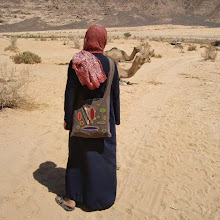Note: names have been changed to protect privacy.
:)
In the community where I’ve lived for the past year
and a half, most women cover their faces in public. The attitude
toward the face-covering stems from a mixture of religion and
culture. Some women cover their faces out of devotion but others do it
simply to protect their identity when travelling in the public world of men –
outside of home and tribe. 3shan akhud ra7tee. This phrase,
which I've heard from many covered women translates roughly to 'take a rest, be
comfortable, not be stressed out.' When one is used to living in a
domestic feminine world at home in the village - full of sisters, aunts
and cousins - food, babies and softness - diving into the rough world of men is
jarring. Though niqab/heimar is a dress code that is
not traditional to the Bedouin community - as Islamic interpretations have
spread and changed and as the post-settlement Bedouin populations have been
exposed to different influences - the niqab has gained popularity for a
variety of reasons. While it can be nearly impossible to separate culture
and religion, I find that some women cover for God, while others do it for
comfort, for family, upon request of their husbands or simply because their
older sisters do it (and in two cases, against the wishes of male relatives).
However, in some cases, women who might cover their faces when travelling
do not cover their faces in the safety of the family neighborhood.
When I first started wearing the niqab,
which I did with little understanding or guidance (what can I say? I'm
famous for spontaneous decision-making!), I picked and chose the places where I
wore it. In self-defined private spaces – like my neighborhood, place of
work and in the homes of friends, I showed my face. In public spaces, I
covered it. Here is what I found.
Walking through Aqaba with a covered face offers a
dramatic change from what I have previously experienced. In the souq,
where the Egyptian store-minders are excited to sell and promote\ their goods
with a shout of hello! or welcome! – all I hear is a gentle ‘please, ma’am, buy
from us.’ No one else looks my way. When walking with a female
friend who covers her head and wears either the long-robed abaya or jilbab, she
notes a difference in her treatment as well – no one speaks to her when she is
with me.
Every space that I return to with a covered face, I
wonder what the reaction will be. I’m familiar with the different
opinions on niqab, but experience brings a new level of understanding.
After a month in-country, it’s time to renew my
visa. I head to the police station. Although a government entity
and therefore staffed by both genders, individual police officers, as in most
places, tend to a more traditional mindset. I am met with incredible enthusiasm
by the two male officers handling my renewal.
“Are you Muslim?”
“Yes.”
“Since how long?”
“About five years.”
“And how long have you worn this?”
“Just a month – but not everywhere.” (As we
shall see, this honest statement will later cause some challenges.)
“That’s fine. As a Muslim, you are only
required to cover your head.”
I nod politely. The conversation shifts as
one of the officers inspects my passport.
“It’s so great you are Muslim! Hey!
You’re born in 19--! I’M born in 19--! You’re birthday is 2-
October?! Mine is the 1-th! I’m just ten days older than
you!”
He’s as a giddy as a school boy. I cease
conversation and sit quietly until my renewal is complete.
I begin to notice that a different dress code
attracts a different type but does not necessarily stymie one’s attractiveness.
It’s been a while since I visited my old
neighborhood. My former neighbors are truly gentle people – their love of
food, farming and a quiet life is one that I’ve always appreciated. They don’t
stray far from home and when I think of them, I am reminded of Tolkein’s
hobbits. My desert hobbits are among the most Muslim of people I’ve
known, taking their practice seriously – keeping their prayers, acting with
generosity and compassion, open to learning and sharing with those who are
different and nearly always reserving judgment. The neighborhood is full
of olive trees, grape arbors and fruit trees. A deep sense of peace
emanates from their land. The most devout ladies in this neighborhood
wear niqab and their intention is a religious one.
Selma and I are sitting on the veranda, sharing tea
and conversation. My niqab is flipped up over my head - my face
revealed. Her teenage niece, visiting from the city, drops by.
“Lina! (That's me.) Mabrouk il
niqab!” (Congratulations on your niqab!)
I blush and stammer a polite thank you.
I start to understand that for faithful Muslims the
choice to wear niqab is one not to be taken lightly and that when worn by a
practicing Muslim – eg. not for reasons of comfort, family or protection -
comes an expectation of behavior and practice.





